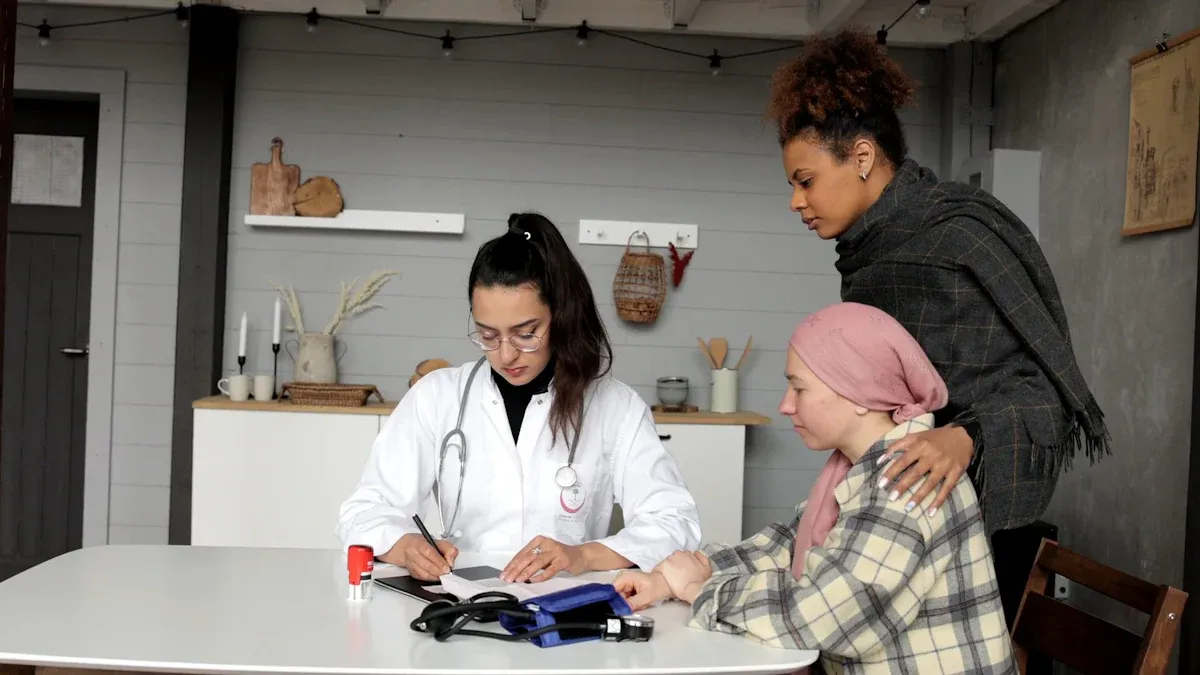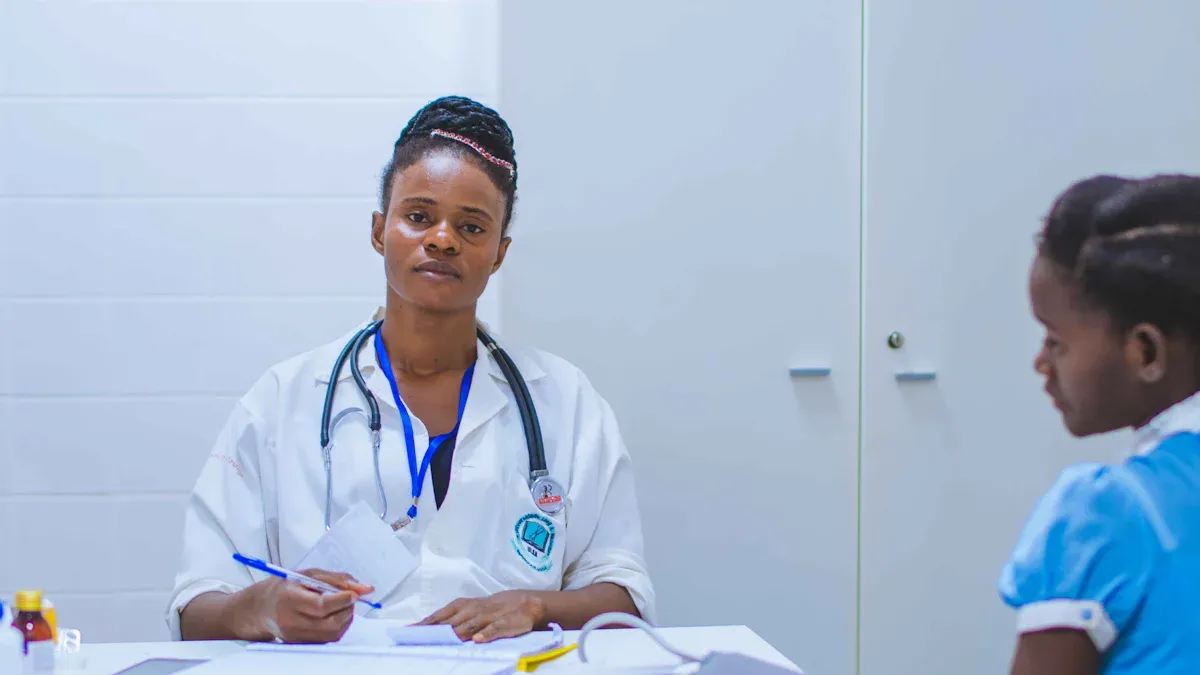Why Doctors Postpone Sharing Cancer Diagnosis Results with Patients

Hearing the words "cancer diagnosis" can be life-changing. You might wonder, "Does no news from your doctor mean your cancer isn’t serious?" Doctors sometimes delay sharing these results due to a mix of emotional and systemic challenges. They face the difficult task of balancing timely communication with the need to ensure accuracy and compassion. For example, studies show that longer intervals between diagnosis and treatment can lead to poorer survival rates in many cases, though some cancers, like low-risk prostate cancer, may not be as affected. Understanding these delays helps you build better communication with your doctor and navigate this critical time.
Key Takeaways
Doctors sometimes wait to share cancer news to avoid upsetting you. Knowing this can help you talk better with your doctor.
Waiting for a diagnosis can make patients feel worried and unsure. Asking your doctor about timing can help calm your fears.
Busy healthcare systems can also cause delays in sharing results. Knowing this can help you understand and adjust your expectations.
Talking openly with your doctor helps build trust. Asking clear questions about your diagnosis can make you feel stronger during tough times.
Delays in treatment can make health problems worse. Acting quickly is important, so stay informed and speak up for your health.
Reasons for Delays

Emotional Challenges for Doctors
Fear of causing emotional distress to patients
Doctors often hesitate to share a cancer diagnosis because they fear the emotional impact it may have on you. They worry about how you might react and whether the news will cause overwhelming distress. This fear can make them delay the conversation, even though they know timely communication is essential. Studies reveal that many oncologists lack proper training in delivering bad news. For example, the study "Communication in Cancer Care" highlights that avoiding these discussions can lead to patient anxiety and feelings of betrayal. Another study, "Delivering Bad or Life-Altering News," shows that physicians often fear emotional reactions and blame, which adds to their stress.
Difficulty in delivering bad news
Breaking bad news is one of the hardest tasks for doctors. Even experienced physicians struggle with this responsibility. According to the study "Why Many Oncologists Fail to Share Accurate Prognoses," doctors sometimes avoid sharing diagnoses because they fear destroying hope. They may also consider cultural sensitivities, which can complicate the conversation. However, research shows that honest discussions do not harm emotional well-being, yet the fear of causing harm persists.
Systemic and Institutional Factors
Delays in diagnostic processes or lab results
Healthcare systems often face delays in diagnostic processes. Lab results may take longer than expected due to technical issues or high demand. These delays can prevent your doctor from sharing results promptly. Overburdened healthcare systems also contribute to this problem. When doctors have limited time and resources, they may struggle to prioritize timely communication.
Overburdened healthcare systems and time constraints
Doctors often work in environments where time is a scarce resource. Overcrowded hospitals and understaffed clinics can make it difficult for them to schedule follow-ups with you. These systemic challenges create barriers to timely communication, leaving you waiting for critical information.
Patient-Related Factors
Waiting for the patient to be emotionally or physically ready
Doctors sometimes wait until you are emotionally or physically ready to receive a diagnosis. They may assess your mental state and decide to delay the conversation if they feel you are not prepared. This approach aims to protect your well-being but can also increase your anxiety.
Challenges in reaching patients or scheduling follow-ups
Reaching you or scheduling follow-ups can also cause delays. Many factors contribute to this, such as lack of awareness about symptoms, financial barriers, or communication challenges. Some patients may ignore symptoms or delay treatment out of fear. Access issues in underserved or rural communities further complicate the process.
Tip: If you find yourself waiting for results, ask your doctor about the timeline and next steps. Understanding the process can help ease your concerns.
Impact of Delays

Emotional and Psychological Effects on Patients
Increased anxiety and uncertainty
Waiting for a cancer diagnosis can feel overwhelming. Delays often lead to heightened anxiety and uncertainty about your health. Studies show that prolonged waiting periods can disrupt sleep and increase the risk of depression. You may feel a loss of control over your situation, which can make it harder to cope. For some, the stigma surrounding certain cancers adds feelings of guilt or shame, further affecting mental well-being.
Delays can also impact how you process and accept your illness. Many patients report distress during this waiting period, which can linger even after receiving a diagnosis.
Strain on patient-doctor trust and relationships
When communication is delayed, it can strain your trust in your doctor. You might feel neglected or question whether your health is being prioritized. This erosion of trust can make it harder to collaborate with your healthcare team, potentially affecting your treatment journey. Open and timely communication is essential to maintaining a strong patient-doctor relationship.
Consequences for Treatment Outcomes
Delayed initiation of treatment plans
Delays in diagnosis and treatment can directly impact your health outcomes. Research highlights that even a one-month delay in treatment increases the risk of cancer progression. For example, longer wait times have been linked to poorer outcomes in breast, cervical, and lung cancers.
Study | Findings |
|---|---|
Doubeni et al., 2018 | Longer wait times linked to poorer outcomes in breast, cervical, and lung cancers. |
Mattosinho et al., 2019 | Delays associated with higher rates of metastatic disease in retinoblastoma patients. |
Graboyes et al., 2019 | Extended time to surgery linked to poorer survival; shorter time to radiotherapy improved survival. |
Potential worsening of the condition
Cancer grows and spreads over time. Delays in diagnosis or treatment can allow the disease to progress, making it harder to treat. Metastasis, the spread of cancer to other parts of the body, is the leading cause of cancer-related deaths. Timely intervention is crucial to prevent this.
Broader Implications
Impact on family and caregivers
Delays in diagnosis don’t just affect you—they also impact your loved ones. Caregivers often experience high levels of stress and depression during this time. A study of caregivers for patients with pancreatic cancer found that 25% reported chronic depressive symptoms at diagnosis. These emotional burdens can persist for months, affecting their quality of life and ability to provide support.
High caregiver stress can also lead to strained relationships within families. When delays occur, the uncertainty can create tension and emotional exhaustion for everyone involved.
Ethical concerns in medical practice
Delays in sharing a diagnosis raise ethical questions about patient care. Doctors must balance the need for accurate information with the responsibility to communicate promptly. Prolonged delays can conflict with the ethical principle of beneficence, which prioritizes the well-being of patients. Addressing these delays is essential to uphold trust and integrity in medical practice.
Note: If you’re waiting for results, remember that “Does No News from Your Doctor Mean Your Cancer Isn’t Serious?” isn’t always true. Silence doesn’t necessarily indicate good or bad news. Asking direct questions about timelines can help you gain clarity and reduce anxiety.
Addressing the Issue
Strategies for Doctors
Training in compassionate communication
Doctors can benefit from structured training programs to improve their ability to deliver difficult news. These programs focus on building communication skills and reducing emotional stress during conversations. Some effective methods include:
Structured communication skills training to enhance clarity and empathy.
Role-playing sessions that simulate real-life scenarios, helping doctors practice handling emotional challenges.
Communication protocols that guide oncologists in delivering cancer diagnoses effectively.
Research supports these approaches. For example, Fallowfield et al. (2002) demonstrated that communication skills training significantly improved oncologists' ability to convey bad news. Similarly, Tulsky et al. (2011) found that computer-based training programs enhanced doctor-patient communication. These tools equip doctors to address your concerns with compassion and professionalism.
Streamlining diagnostic and reporting processes
Streamlining diagnostic workflows can reduce delays in sharing results. Hospitals can adopt digital tools to track lab results and automate reporting. This ensures that doctors receive accurate information promptly. By improving these processes, healthcare providers can minimize the waiting period and prioritize timely communication with you.
Empowering Patients
Encouraging patients to ask questions and seek updates
You play a vital role in your healthcare journey. Asking questions and seeking updates can help you stay informed and reduce anxiety. Studies show that interactive communication styles, where doctors acknowledge your emotions and provide clear guidance, improve your sense of control. For instance, 79% of patients who engaged in such discussions reported feeling more peaceful and hopeful.
Providing resources for emotional support
Access to emotional support resources can make a significant difference. Support groups, counseling services, and educational materials help you cope with the stress of waiting for a diagnosis. Oncologists should also tailor information to your needs, offering hope without misleading you. This approach fosters trust and helps you navigate the uncertainty.
Tip: If you’re wondering, "Does No News from Your Doctor Mean Your Cancer Isn’t Serious?", remember that silence doesn’t always indicate bad news. Proactively asking about timelines can provide clarity and peace of mind.
Systemic Improvements
Investing in healthcare infrastructure to reduce delays
Healthcare systems must invest in infrastructure to address delays. Expanding diagnostic facilities and hiring more staff can alleviate the burden on overworked doctors. Advanced technologies, such as AI-powered diagnostic tools, can also speed up the process, ensuring you receive timely results.
Implementing policies for timely communication of results
Hospitals and clinics should establish clear policies for sharing diagnostic results. These policies can include setting deadlines for reporting and creating dedicated teams to handle patient communication. By prioritizing timely updates, healthcare providers can enhance your experience and reduce the emotional toll of waiting.
Does No News from Your Doctor Mean Your Cancer Isn’t Serious?
Common Misinterpretations of Silence
Patients assuming no news means good news
When you don’t hear back from your doctor, it’s easy to assume that no news means everything is fine. Many patients believe silence indicates a non-serious diagnosis. However, this assumption can be misleading. Studies show that patients with advanced cancer often misunderstand their prognosis. This happens even when doctors provide information. Optimism about life expectancy and treatment outcomes can cloud judgment. Miscommunication or lack of updates doesn’t always mean your condition is less severe.
Patients with metastatic cancer, for example, often feel hopeful about their prognosis. This optimism persists even when doctors haven’t shared detailed results.
A study found that 64% of patients with incurable lung cancer didn’t realize radiation therapy wouldn’t cure their disease. This highlights how silence or unclear communication can lead to false conclusions.
Patients fearing silence means bad news
On the other hand, you might fear that silence means the worst. Waiting for results can create anxiety, leading you to imagine the worst-case scenario. However, delays often stem from systemic issues, not the severity of your condition. For instance, lab results may take longer due to high demand or technical challenges. Doctors may also wait to ensure they have accurate information before discussing your diagnosis.
Note: Silence doesn’t always mean good or bad news. It’s important to seek clarity rather than make assumptions.
How to Seek Clarity
Asking direct questions about timelines
You can reduce uncertainty by asking your doctor direct questions. Inquire about when you can expect results and what steps follow. Patients often prefer receiving bad news in person, with clear and honest language. Make sure to ask for adequate time to discuss your concerns. This approach helps you stay informed and feel more in control.
Understanding the diagnostic process and potential delays
Learning about the diagnostic process can help you manage expectations. Delays may occur due to factors like lab backlogs or the need for additional tests. Doctors often tailor their communication to your preferences, ensuring they provide accurate information without causing unnecessary distress. By understanding these factors, you can better navigate the waiting period.
Tip: If you’re wondering, "Does No News from Your Doctor Mean Your Cancer Isn’t Serious?", remember that silence doesn’t always reflect the seriousness of your condition. Proactively seeking updates can ease your concerns.
Delays in sharing cancer diagnosis results stem from emotional, systemic, and patient-related factors. Doctors may struggle with delivering bad news, while healthcare systems face resource shortages. These delays can increase anxiety, worsen health outcomes, and strain relationships.
A one-month delay in treatment raises the risk of cancer death.
Barriers like short-staffed hospitals and fear of symptoms also contribute.
Managing emotional distress through psychotherapy can improve outcomes. You can take charge by asking questions and seeking updates. Open communication with your doctor ensures clarity and builds trust, empowering you to navigate this journey with confidence.
FAQ
What should you do if your doctor hasn’t shared your cancer diagnosis results yet?
You should contact your doctor’s office to ask about the status of your results. Politely request a timeline for when you can expect to hear back. This proactive approach helps you stay informed and reduces unnecessary stress.
Why do lab results sometimes take longer than expected?
Lab delays often occur due to high demand, technical issues, or the need for additional testing. These factors ensure accuracy but can extend the waiting period. Understanding this process can help you manage your expectations.
Does no news from your doctor mean your cancer isn’t serious?
Not necessarily. Silence doesn’t always indicate good or bad news. Doctors may wait to confirm results or face systemic delays. Asking direct questions about timelines can provide clarity and ease your concerns.
How can you prepare for a follow-up appointment after receiving results?
Write down your questions and concerns before the appointment. Bring a trusted friend or family member for support. This preparation ensures you get the information you need and feel more confident during the discussion.
Can delays in diagnosis affect your treatment outcomes?
Yes, delays can impact treatment outcomes. Cancer may progress during this time, making it harder to treat. Early diagnosis and timely intervention are crucial for improving survival rates and overall health.
See Also
Recognizing Duodenal Cancer Symptoms And Available Treatments
Exploring Symptoms And Causes Of Laryngeal Cancer
A Simple Explanation Of Extrahepatic Bile Duct Cancer
Understanding Hepatoblastoma And Its Frequently Seen Symptoms

